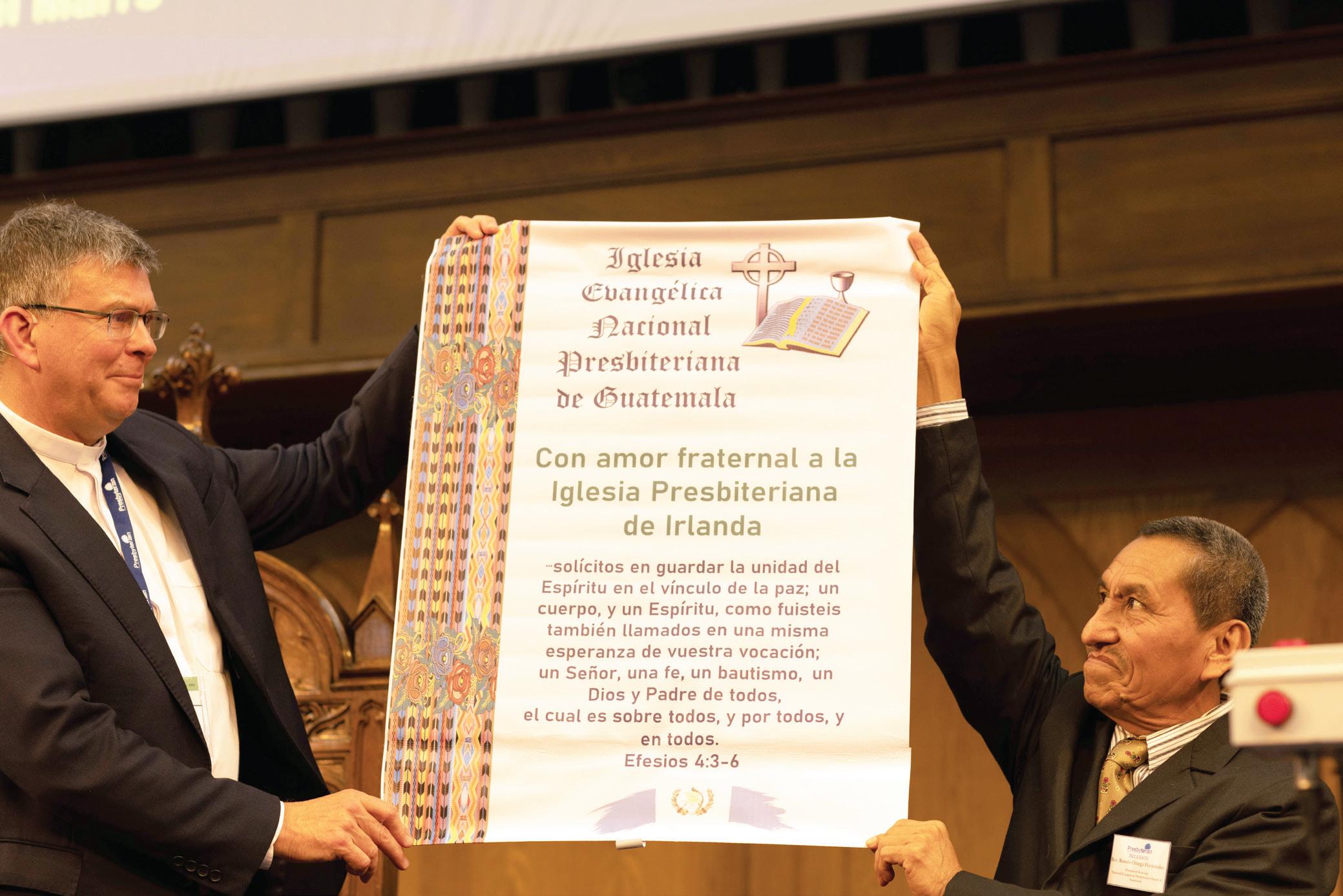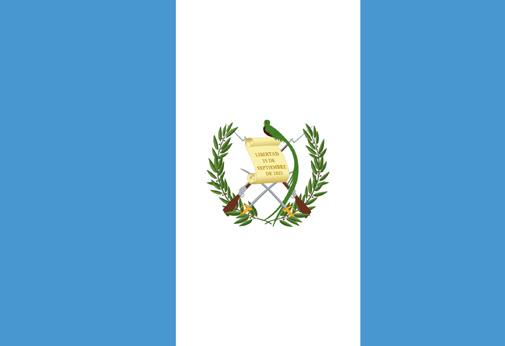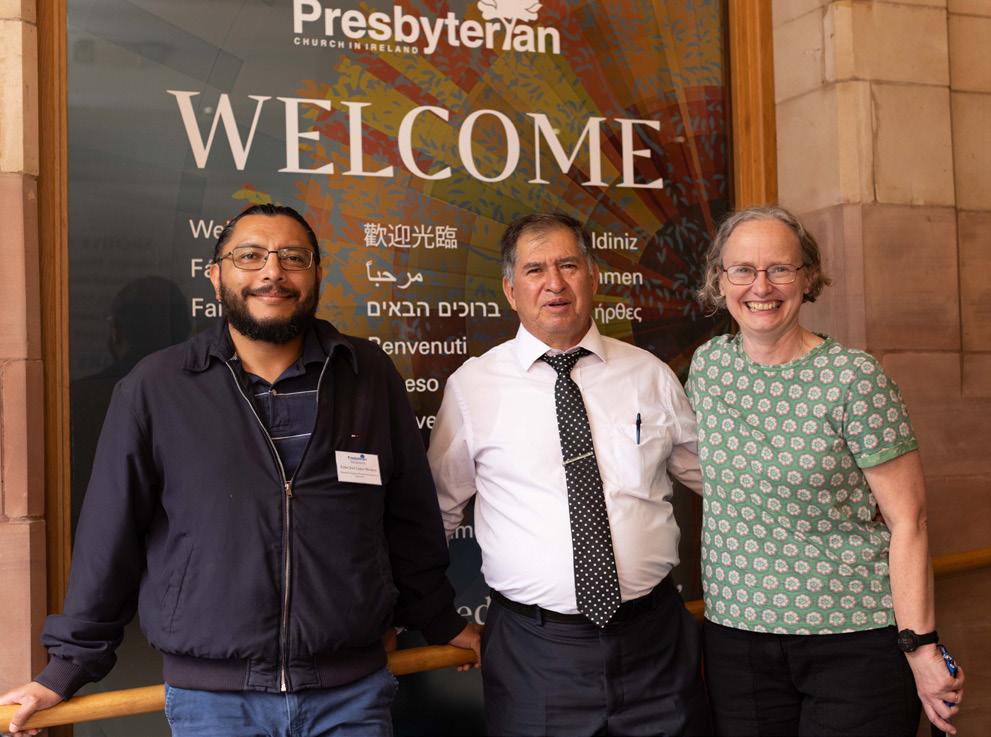
6 minute read
Exploring partnership
In a first for PCI, a delegation from the National Evangelical Presbyterian Church of Guatemala attended this year’s General Assembly. Suzanne Hamilton interviewed its Moderator, Rev Laurence Cifuentes, about his Church’s turbulent past, and the challenges and opportunities it faces.
‘Global disciples sharing God’s heart for the world, declaring good news and demonstrating God’s love’ is the strapline for PCI’s Council for Global Mission.
This emphasis on the Great Commission and the call to authentic fellowship with brothers and sisters in Christ around the world is reflected in PCI’s long history of sending missionaries and global mission workers across the globe, but also in its many partnerships spanning Europe, the Middle East, Africa, Asia and South America.
A new partnership currently being explored is with the National Evangelical Presbyterian Church of Guatemala, and a five-strong delegation travelled over 5000 miles to attend this year’s General Assembly.
Explaining the reason behind the visit, Moderator Rev Laurence Cifuentes said it was an opportunity to “see what you have, what the Lord has built here,” adding, “That challenges us and it’s a great inspiration to us.”
The National Evangelical Presbyterian Church of Guatemala is looking to the future, having endured turbulent times in its 140-year history.

Gaining a foothold in a country heavily influenced by the Roman Catholic Church and Mayan culture has not been easy. Indeed, religious freedom only became a possibility following the liberal revolution of 1871, which brought Justino Rufino Barrios to power.
“We believe the Lord used the president,” said the Moderator. Not a believer himself, but wanting to dilute the power of the Catholic Church, Barrios went to the United States and invited the first Presbyterian missionary, John Clark Hill, into the country.
“The church growth, at the beginning, was frustrating and the first missionary almost failed in his task. Poverty at the time was really bad in the country, and he started helping out many of the poor people, but that ended up being a kind of paternalistic help, and when the help stopped, the movement almost died out,” explained Mr Cifuentes.
The Bible has been translated into six languages, but the rest remained to be reached.
An American school founded at the time also floundered, leading the first Presbyterian missionary to return to the US, to be replaced by Edward Haymaker, who established what is considered the foundation of the mother church.
“As a sign of God’s blessing, the president at the time gave him a piece of land next to the government palace. To this day, the Presbyterian church stands in this – it has become a symbol of Presbyterian work in Guatemala,” explained Mr Cifuentes.
Despite fierce opposition from the Catholic Church and Mayan culture, it grew and the National Evangelical Presbyterian Church of Guatemala was formed in 1882, with the first presbytery – called West – established in 1923.
Such was the opposition that the Presbyterians, Baptists, Methodists, Quakers and the Nazarene Church formed an interdenominational synod, which lasted until 1956, when the National Evangelical Presbyterian Church in Guatemala was formally recognised as a Church by the state.
“This was a big step forward for the Church. It also allowed the Catholic Church to understand there was actually freedom of religion in the country, and they had to respect that,” explained the Moderator.
The influence of the Catholic Church still runs deep in the Central American country today though, with many identifying as Catholic simply because their parents and grandparents were before them.
“It’s more of a tradition than an informed decision…and so many people that convert haven’t fully understood the gospel. They try to bring their Roman Catholic traditions into the Presbyterian Church. And so that’s the battle of thought that we have,” he said, adding, “We need to present the gospel not as a religion, but as a way of life that every child of God, every true child of God, needs to live out...that’s our greatest challenge nowadays.”
If you have good teaching, you’re going to have good results. If not, then the results are not going to be there.
It has not just been external forces which have threatened the Church throughout its history. A 30-year civil war created tensions within, leading ultimately to a split in the 1990s, due to the involvement of many church leaders in this conflict.
“When that division happened, those of us who left started growing exponentially, and those who were left within the Church started decreasing.
“In a way, the influence of the US (Presbyterian) Church worked for the best here because they conditioned their help to the churches that remained within the official Church, to look for reconciliation with those churches that had separated from the denomination. It brought them back together and started the reconciliation process, and the majority of churches that went out, returned,” he explained.
Since then, new presbyteries have been established, and the General Assembly was formed on 31 October 2017 – Reformation Day.
There are still many challenges, and opportunities, for the Church to navigate, however. Despite having around 470 congregations, the Church has only reached a handful of Guatemala’s ethnic groups, of which there are over 20. “The Bible has been translated into six languages, but the rest remained to be reached,” said Mr Cifuentes.
Theological education is also a pressing issue. There are few young candidates aspiring to the ministry due to a number of reasons. Better opportunities in countries such as the United States leads many to emigrate. Furthermore, universities often offer classes at the weekends, so many invest their time there instead of going to church.
There are theological seminaries throughout the country, but Mr Cifuentes says many of the courses are superficial. He would like to see the seminary of the National Evangelical Presbyterian Church in Guatemala take the lead in raising standards to its level.
“We need to standardise theological education through the whole country. A lot depends on this, on the right theological education. If you have good teaching, you’re going to have good results. If not, then the results are not going to be there.”
There is also a recognition within the Church that the principles of the Reformation weren’t taught well when the first missionaries first preached the gospel in Guatemala all those years ago.
“They won many people over, but they didn’t teach them any theology. They wanted the national church in Guatemala to come up with their own theology, so many customs were brought over into the life of the Church and many good things from the Reformation were lost,” explained Mr Cifuentes, adding that the interdenominational synod also created issues, for instance, Presbyterians were forced to stop baptising infants by the other Churches.
The National Evangelical Presbyterian Church of Guatemala now hopes to move forward through partnerships, like the one currently being explored with PCI. “Our hope is to establish fellowship bonds with Reformed Churches that hold true to the true principles of the Reformation,” said Mr Cifuentes.



